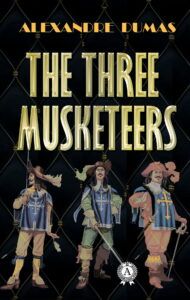Not many a person hasn’t heard of The Three Musketeers, but very few know the story’s true origin.
It was first published in France, in 1844 by Alexandre Dumas and is full of dramatic swordfights, dangerous love, and swashbuckling adventure. It has plenty of humour and almost absurd ridiculous conversations throughout. However, Dumas also touches on more serious topics; the rising political discordance in France, the consequences of marital affairs, and the brutal reality of war.
This novel is the basis of many a loved adaptation, and with good reason too. It’s a primarily light-hearted tale, about friendship, love and honour that hooks readers from the very first page. As a result, it’s one of the most compelling novels of the 19th century and by far Dumas’ best-known work.
Summary
It follows the young and impressionable d’Artagnan over the span of three years in France. Despite initially wanting to join the famous Musketeers of the Guard, he quickly becomes sidetracked and ends up on an entirely different adventure. He befriends the formidable Athos, Porthos and Aramis, falls in love with a mysterious woman, and irreparably entangles himself with the Queen of France and her own clandestine affairs. He rebels against traitorous leaders, rescues the stereotypical damsel-in-distress, and deals with heartbreak and regret as everything soon begins to spiral out of his control.
Commentary
The Three Musketeers is one of my favourite novels for its heartwarming story of comradery and courage. Although many would agree with that statement, there are a few who would differ for a number of reasons.
The four main characters and likeable, interesting, and most importantly, realistic. Each of the Musketeers has their own life to lead, and each has a complicated past that still affects them today. They’re first introduced as fully-formed characters, and likewise, they exit the novel having grown and developed in the most plausible of ways. Without giving the story away, the villain is also an incredibly interesting and complex character. They’re not what you’d expect from the stereotypical ‘bad guy’, and get a suitable ending that is usually ignored in most novels.
D’Artagnan may be a realistic character, but unfortunately, that also means he has a number of faults. One of which is falling in love at the drop of a hat. Although this might appeal to some, I personally found it grating for such a young man to proclaim his undying devotion to multiple women he barely knew.
“All for one and one for all” isn’t the only notable line in the book. The Three Musketeers is full of rich language and complex conversations that flow into one another. The words used will make the reader laugh and cry in equal measure. As brilliant as the language used by Dumas is, it can get a little dense at times. The novel is famous for its 60-page introduction, but don’t let that scare you! Some paragraphs are tougher to get through than others, but they only add to the atmosphere of this swashbuckling adventure.
Considering that this novel is centred around the Musketeers of the Guard, a traditional military branch of the royal family, there is quite a lot of bloodshed. It’s set in pre-revolution France where duels and war are commonplace, so murder is never far away.
Recommendations
Overall, I’d give Alexandre Dumas’s The Three Musketeers four out of five stars. Most critics consider it one of the greatest books in history for a reason after all. I’d definitely recommend this novel to anyone who’s a fan of adventure, action, or historical fiction. Although some parts of it can seem daunting to get through, it is well worth the read and won’t let you down!

Want to read it for yourself? You can find it in:
Prefer to listen to it instead? You can find it on:
Find me on Goodreads or StoryGraph!
